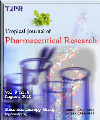
|
Tropical Journal of Pharmaceutical Research
Pharmacotherapy Group, Faculty of Pharmacy, University of Benin, Benin City, Nigeria
ISSN: 1596-5996
EISSN: 1596-5996
Vol. 16, No. 5, 2017, pp. 1013-1020
|
 Bioline Code: pr17130
Bioline Code: pr17130
Full paper language: English
Document type: Research Article
Document available free of charge
|
|
|
Tropical Journal of Pharmaceutical Research, Vol. 16, No. 5, 2017, pp. 1013-1020
| en |
Antiproliferative activity of extracts of Euphorbia tirucalli  L (Euphorbiaceae) from three regions of Brazil L (Euphorbiaceae) from three regions of Brazil
Caxito, Marina L do C; Victório, Cristiane P; Costa, Helber B da; Romão, Wanderson; Kuster, Ricardo M & Gattass, Cerli R
Abstract
Purpose: To investigate Euphorbia tirucalli extract for probable geographic variations in its
antiproliferative activity.
Methods: The aerial parts of E. tirucalli were collected in the Brazilian states of Mato Grosso, Rio de
Janeiro, Pará, Minas Gerais and Santa Catarina. The 70 % ethanol extract was obtained according to
the procedure described in Brazilian Homeopathic Pharmacopeia. The antiproliferative activity of
extracts, in concentrations of 62, 125, 250, and 500 μg mL-1, was tested against leukemia (HL-60),
lymphoma (Daudi) and melanoma (B16F10) cell lines using methyl thiazol tetrazolium assay (MTT).
Phytochemical analysis were carried out using High-performance liquid chromatography-diode array
(HPLC-UV-DAD) and electrospray ionization Fourier transform ion cyclotron resonance mass
spectrometry (ESI(-) FT-ICR MS) assays.
Results: There was significant regional variability in the cytotoxicity of E. tirucalli extracts in a dose-dependent
manner. The extracts had similar activity towards leukemia cell line HL-60, decreasing cell
viability to about 60 – 70 %. The extract showed the presence of ellagitannins, flavonoids,
veracylglucan, and acid triterpenes as the major compounds.
Conclusion: While the results support the ethnopharmacological use of E. tirucalli throughout Brazil,
regional quantitative differences found in some classes of secondary metabolites may explain the
variations observed in antitumor activity.
Keywords
Aveloz; Cancer; Cytotoxicity; Antiproliferative; Ethnopharmacological; Traditional medicine
|
| |
© Copyright 2017 - Pharmacotherapy Group, Faculty of Pharmacy, University of Benin, Benin City, 300001 Nigeria.
Alternative site location: http://www.tjpr.org
|
|
